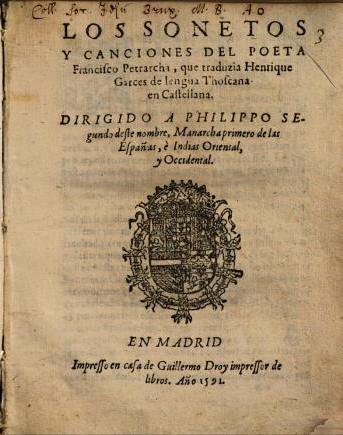
Libraries
Libraries
The sonets and song of the poet Francisco Petrarca … translated by Henrique Garcés
In 1585 circulated in the Spanish world, within an extraordinary pastoral novel, La Galatea, the famous Canto de Calíope, series of Sicilian octaves with which Miguel de Cervantes Saavedra celebrated the poets of the Court of Felipe II. Therein the American scholars were also praised:
De un Enrique Garcés, que al piruano
reino enriquece, pues con dulce rima,
con sutil, ingeniosa y fácil mano,
a la más ardua empresa en él dio cima,
pues en dulce español al gran toscano
nuevo lenguaje ha dado y nueva estima,
¿quién será tal que la mayor le quite,
aunque el mesmo Petrarca resucite? (octava 75)
This translation is estimated to be the most successful in Spanish up to now. The volume was published in Madrid in 1591 with two volumes: a translation of Os Lusíadas by Luys de Camões and a Latin treatise by Franceso Patrizi. Garcés had returned to Madrid from his mining adventure in America and published at least part of his translation work. We find of special interest for the study, the preliminary poems of this volume, where Pedro Sarmiento de Gamboa, a cosmographer scholar, devotes laudable verses to Garcés work as a translator.
Martina Vinatea, in her edition of the la Epístola de Amarilis a Belardo, has extensively studied the influence of Petrarchism on the work of Amarilis: topics such as “the Song as a Literary Form” (pp. 32-35), “Petrarch: the poet of the song “(pp. 35-36),” The incorporation and permanence of the Petrarchan song in the Spanish lyric “(pp. 36-37), ” The development of the Petrarchist song in Peru “(pp. 38). An adaptation of part of her study can be consulted in our Glosario de Indias (Petrarquismo en la lírica hispánica).

